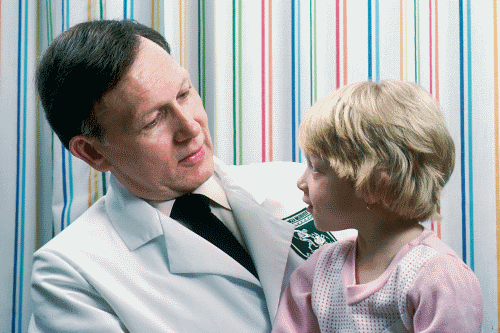Three large problems a clinical psychologist or psychiatrist may face are evaluating children, interference from contributing biological factors and misunderstandings due to cultural disparities.
Evaluating Children
 Young children may lack the communication skills to openly discuss their thoughts and feelings, making it difficult to understand their situation and provide a clear diagnosis. For example, a child who is experiencing depressive symptoms and seems to be reclusive may simply refuse to answer or give a dismissive response such as 'I don't know'. Often, information is obtained from parents about the child, but they could be biased or offer unhelpful interpretations of their child's behaviour rather than pure facts. It becomes particularly problematic if the parenting is a contributing factor to the child's problem as the child may be more reluctant to say anything with the parent there, or said parent may outright conceal an issue.
Young children may lack the communication skills to openly discuss their thoughts and feelings, making it difficult to understand their situation and provide a clear diagnosis. For example, a child who is experiencing depressive symptoms and seems to be reclusive may simply refuse to answer or give a dismissive response such as 'I don't know'. Often, information is obtained from parents about the child, but they could be biased or offer unhelpful interpretations of their child's behaviour rather than pure facts. It becomes particularly problematic if the parenting is a contributing factor to the child's problem as the child may be more reluctant to say anything with the parent there, or said parent may outright conceal an issue.
Some testing methods have been created for assessing children, including the Children's Depression Inventory. However, discussion in terms of diagnosing children with serious mental illnesses remains controversial and therefore most assessments focus on determining the presence of disabilities or developmental problems, like intelligence tests, motor tests, and school readiness tests, rather than mental syndromes.
Contributing Biological Factors
Understanding physiological and neurophysiological factors in the individual is important so that any underlying physical conditions can be ruled out. For example, thyroid disorders can cause symptoms related to depression and anxiety and a brain tumor affecting perceptions and behaviour could lead to misdiagnosis of schizophrenia or a personality disorder. These cases require special, if not entirely different styles of treatment and so much be identified On occasion, a physical disease may be found that requires no extra mental treatment once it is cured.
Neurophysiological factors, such as drug use, also need to be taken into consideration. Both legal and illegal drugs can cause hallucinations, paranoia, and anxiety, which may appear to be symptoms of schizophrenia or other mental illnesses. Cognitive and intellectual functioning should be tested as well to prevent similar misdiagnoses simply because the individual has something like a poor short-term memory causing agitation, paranoia, and anxiety.
Clients from Other Cultures
 Due to cultural relativism, the clinician must separate their own beliefs and norms in order to remain unbiased. Otherwise something that is relatively normal in a foreign culture might be noted as abnormal by a psychologist working from the framework of his or her own culture and lead to misdiagnosis. For example, some cultures have a widespread belief in spirits and a Western atheist clinician would have to realise this before he or she marked down talking to spirits as a symptom of mental disorder. Many standardised tests were also devised using samples from a particular culture and so an unusual result from such a test should be considered in tandem with the client's cultural background.
Due to cultural relativism, the clinician must separate their own beliefs and norms in order to remain unbiased. Otherwise something that is relatively normal in a foreign culture might be noted as abnormal by a psychologist working from the framework of his or her own culture and lead to misdiagnosis. For example, some cultures have a widespread belief in spirits and a Western atheist clinician would have to realise this before he or she marked down talking to spirits as a symptom of mental disorder. Many standardised tests were also devised using samples from a particular culture and so an unusual result from such a test should be considered in tandem with the client's cultural background.
Language barriers can hinder the assessment and diagnosis process, and if interpreters do not translate the clinician questions or client answers appropriately. Before assessing the individual, the clinician should develop a therapeutic, respectful relationship with the client so they can better understand the data they collect through conversation, testing and observation to make a fitting diagnosis.
Other Difficulties
Problems in assessment and diagnosis of a patient can be related their willingness to answer honestly to interviews and questionnaires. During interviews, and even in behavioural monitoring, a client can say and act in ways they normally do not in order to present themselves in ways they think the clinician wants to see. For example, an individual with an eating disorder who is keeping a food log to try and increase their intake may lie by adding more food on the log than what they actually ate, or may tell their clinician that they're eating more when they aren't.
Clinicians can also be at fault by following confirmation bias. If a clinician obtains information about the client and makes a preconceived decision about their diagnosis and treatment without completing a full assessment, then they are likely to ignore facts that discount their hypothesis and tune in to facts that match. This can result in improper assessment and treatment.
Clients from Other Cultures Image Credit: DIABP images
© BrainMass Inc. brainmass.com July 25, 2024, 8:49 pm ad1c9bdddf